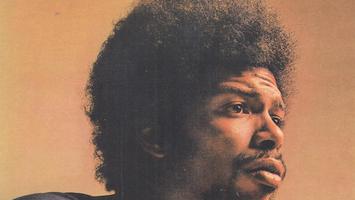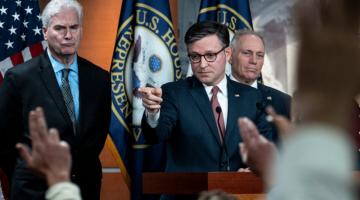Every single US president—regardless of party—actively upheld white supremacy in the US.
“Kimberley’s volume belongs on the shelf next to the works of Howard Zinn and Roxanne Dunbar-Ortiz.”
The myth of US American “greatness” is not only a right-wing narrative. Liberals too embrace the concept that the nation is fundamentally good; certainly, they insist, our worst days are behind us and we can all be grateful for the progress we’ve made. Leading us on this shining path have been enlightened figures like Lincoln, FDR, Kennedy, Carter and Obama, all of whom have sought to fulfill the promise of the wise “Founding Fathers” and their brilliant (even sacred) Constitution.
In her recently released book, “Prejudential: Black America & the Presidents,” writer and activist Margaret Kimberley skewers this fantasy. She takes on every president from Washington to Trump, with a chapter devoted to each. With the accessible, no-nonsense but pointed style she employs in her weekly Freedom Rider column on Black Agenda Report, Kimberley summarizes the words and deeds of the 44 men who have held the office. The facts are damning.
“Kimberley takes on every president from Washington to Trump.”
I consider myself a history buff and have read many books and articles about US history in particular, but there wasn’t a single chapter that didn’t contain surprises for me, in some cases big ones. Some of the things that were new to me:
+ George Washington not only kept his slaves while president, but rotated them between Philadelphia (the capital then) and his plantation in Virginia every six months, in order to skirt a Pennsylvania law that allowed slaves to sue for freedom after more than six months in the state.
+ Eleven presidents following Washington owned slaves, including seven who held onto them while in office. That’s over a quarter of the total!
+ Lincoln’s vision for blacks was to expel them from the US and set them up in a colony in Africa or Central America. He was considering such a proposal just days before his death.
+ In 1901, a black man named Benjamin Parker physically prevented President McKinley’s assassin from firing a third shot. Parker was a waiter at the World’s Fair where McKinley was appearing, and was standing in line to meet him when the attack happened. Kimberley tells us: “According to one story, at least one Secret Service agent was busy looking at the black man instead of observing the crowd as he should have been doing.”
+ Theodore Roosevelt betrayed the Twenty-Fifth Infantry Regiment, which was made up entirely of black soldiers. In July 1906, the regiment was assigned to stay in Brownsville, Texas, but the local white population harassed them from day one, and falsely accused them of committing murders. In response, Roosevelt announced that the entire regiment—all 167 members—were “dishonorably discharged, deprived of pensions, and prevented from gaining federal employment or reinstatement to the army,” but put off the announcement until the day after the 1906 election (for which he actively sought black votes during the campaign). This offense was consistent for someone who believed that blacks were, in his own words, “altogether inferior to whites.”
“Lincoln’s vision for blacks was to expel them from the US.”
+ Democrat Woodrow Wilson instituted segregation in federal employment. He also didn’t lift a finger to prevent a rash of white mob violence against blacks in multiple states during the “Red Summer” of 1917, during which over a hundred blacks were murdered and thousands made homeless.
+ While working as Assistant Secretary of the Navy under President Wilson, future president Franklin Delano Roosevelt “personally ordered separate restrooms” for blacks and whites in federal facilities.
+ Truman used the n-word his entire life and opposed the integration of businesses and public accomodations.
+ Kennedy tried to stop the March on Washington in 1963, the event where MLK gave his “I Have a Dream” speech. His attitude towards civil rights activists was that they should “cool off.”
+ On the subject of ending segregation, Carter said: “I see nothing wrong with ethnic purity being maintained. I would not force racial integration of a neighborhood by government action.”
Kimberley’s volume is packed with such information. A single reading is not enough to absorb it all. As a compilation of history, it belongs on the shelf next to the works of Howard Zinn and Roxanne Dunbar-Ortiz. It should be required reading in every school.
On the topic of our collective historical amnesia on these topics, Kimberley writes:
“Why are these facts not widely discussed today? The United States still basks in the glory of a romanticized past. If white people had the right at the time to kill Indians and take their lands and turn those lands over to the plantation economy, then they probably harbor related feelings of entitlement today. If the institutions of slavery and its aftermath aren’t examined, then objective truths like the inordinate number of blacks being killed by police won’t be questioned, either. If people like [Zachary] Taylor could steal half of Mexico and be labeled heroic, then modern-day presidents can invade nations, change regimes, and kill with mechanized drones and be considered heroic, too. Today’s propaganda differs little from that of Taylor’s era. In fact, it relies on it. If the past is examined through a microscope, then the present must be as well, and that would create cognitive dissonance.”
“If the institutions of slavery and its aftermath aren’t examined, then objective truths like the inordinate number of blacks being killed by police won’t be questioned, either.”
But the (blue-eyed) devil is not just in the details. Kimberley’s book also paints a picture of the overall sweep of events over the last 230+ years.
After the famous Founding Fathers, the presidents of the 1800s are little known, and even unheard of, except for Lincoln and maybe Grant. But as Kimberley demonstrates, every single one—regardless of party—actively upheld white supremacy in the US. Before the civil war, all of them were in favor of keeping the institution of slavery. Afterwards, they were united in their efforts to keep blacks powerless through disenfranchisement, segregation, and lynching.
Speaking about conditions at the turn of the century, Kimberley says:
“The Democrats were the party of open and proud white supremacy, and Republicans were considered the only reasonable option in the face of lynch law terrorism. This pattern of promising support that never materialized would recur into the twenty-first century. The effort to pass an anti-lynching bill foundered and was equally unsuccessful for the next five decades. Presidents may have sought black votes, but the support of black voters never mattered very much when action was needed to protect their lives.”
If some progress can be said to have been made by the Civil Rights movement of the ’50s and ’60s, it must also be admitted that, starting no later than Reagan, a strong counter-offensive gained traction against it, imposed top-down from 1600 Pennsylvania Avenue. Clinton’s contribution was “ending welfare as we know it” and his “crime bill,” which were both anti-black and brown, and which could only have been passed in a Democrat-controlled Congress by a Democrat president. He and his “two for the price of one” wife have never been properly condemned for these (and other) abhorrent policies. Both Bushes, before and after Bill, were racists, despite W’s “diverse” cabinet. For being the first black president, Obama had to put in special effort to prove he wasn’t going to rock the white boat; at his speech on the anniversary of the March on Washington, he “gave a very good standup impression of a racist white man,” to quote the Black Agenda Report’s Glen Ford. And not for nothing did the Black Lives Matter movement flare up under his watch.
“Presidents may have sought black votes, but the support of black voters never mattered very much when action was needed to protect their lives.”
On the subject of Obama, Kimberley explained:
“The rules for being a ‘serious’ candidate go something like this: Don’t make rich people angry. Don’t make white people angry. Don’t appear to help black people in any way, because that gets white people angrier than just about anything else. Obama knew this, but he was also instinctively a conservative man… During his first campaign in 2008 he spoke lovingly of Ronald Reagan as a ‘transformative’ public figure.”
“Transformative” is one way to describe “the Gipper.” Another would be as an unrepentant bigot.
As Kimberley illustrates, the history of the US is very much the history of white supremacy, pivoting on slavery and its aftermath. Every president from the beginning has either been a southerner defending southern racism or a northerner afraid to challenge it for fear of losing southern votes (all the while denying northern racism). We have not escaped this yet. Thanks to gerrymandering and widespread voter suppression, this country is still being run by a minority made up of white racists from the South, along with their unholy allies in the West and Midwest. The gutting of the Voting Rights Act in 2013—under the watch of a president who was a lawyer of constitutional law—has not received the attention or remedy it deserves.
Trump is the last president that Kimberley describes and she ends with this:
“Trump is no anomaly. He appears at the recent end of a continuum that began with a series of slaveholders… While Trump’s demeanor makes him seem like an outlier, history proves that he is not.”
After reading this book and reflecting on the tenacity of institutional and cultural racism in the United States, one might be tempted to say, “the more things change, the more they stay the same.” One could also draw inspiration from the movements and figures who have been righteously resisting this whole time. They are the real heroes in our history: the ones in the streets, churches and squares—certainly not any of the men who have ruled from the White House.
Kollibri terre Sonnenblume is a writer living on the West Coast of the U.S.A. More of Kollibri’s writing and photos can be found at Macska Moksha Press.
This article previously appeared in Counterpunch.
COMMENTS?
Please join the conversation on Black Agenda Report's Facebook page at http://facebook.com/blackagendareport
Or, you can comment by emailing us at comments@blackagendareport.com



















